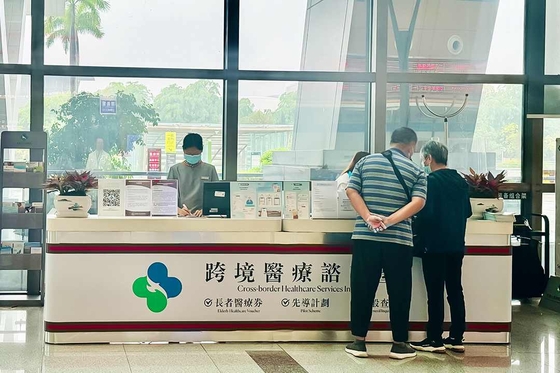In Depth: Why Hong Kongers Are Traveling to the Mainland for Health Care
Hong Kongers are still going to Guangdong province, especially Shenzhen, for medical care, adding to the list of reasons that have traditionally included low-cost luxuries such as dining and shopping. [para. 1]. Despite Hong Kong’s high medical standards and world-leading life expectancy (80.7 years for men and 86.8 years for women) [para. 2]citizens prefer medical services in the mainland [para. 3].
Shenzhen has seen an increase in cross-border medical tourism from Hong Kong, with local hospitals such as HKU-SZH reporting significant outpatient visits for non-emergency services such as cosmetic procedures, medical dentistry, ophthalmology and traditional Chinese medicine. For example, HKU-SZH reported 40,493 outpatient visits from Hong Kong residents in the first quarter of this year. [para. 4][para. 5][para. 6]. Dr. Yu Sze Yuen of HKU-SZH notes that many patients in Hong Kong come for general services dealing with chronic conditions such as diabetes and hypertension. [para. 7].
Affordable prices and fast service in the mainland are major advantages. For example, Wang Yuan, a 70-year-old Hong Konger, reported more savings on reading glasses and dental services in Shenzhen compared to Hong Kong. [para. 8][para. 9][para. 10]. Conventional surgeries also tend to be less expensive; Knee surgery costs about HK$27,000 in Shenzhen, compared to over HK$100,000 in a private hospital in Hong Kong. [para. 11]. In addition, traditional Chinese medicine, which is highly sought after by Hong Kong residents, is available at a much lower cost in the mainland. [para. 12].
Even for serious health conditions like cancer, the continent offers new treatments that are readily available. Drugs such as Pfizer’s Lorlatinib for lung cancer have seen significant price reductions thanks to government negotiations, making them more affordable for patients. [para. 13][para. 14][para. 15]. However, the majority of Hong Kong residents still seek treatment locally, with only a small fraction crossing the border for care. [para. 16][para. 17].
Hong Kong’s dual health care system combines the public safety net with the private sector for high-quality, fast-paced services. Public administration is under pressure due to high demand and shortage of staff; Professional consultations usually have a minimum waiting period of 10 weeks [para. 20][para. 21][para. 22]. As the aging population increases the pressure on the system, many citizens find public health care an attractive alternative. [para. 23].
The Hong Kong government also promotes the monitoring of cross-border medicines. The Elderly Health Care Voucher (EHCV) Greater Bay Area Pilot Scheme now allows residents aged 65 and over to use their vouchers at selected hospitals and clinics in the mainland, facilitating more than 160,000 visits since 2015 . [para. 24][para. 25].
To combat the high costs in Hong Kong, many residents are exploring the country’s medical insurance options. These include basic medical insurance plans for workers and those living in towns and cities, with job categories available with a permanent resident card. [para. 26][para. 27]. For example, Lin Yi, a Hong Konger, has kept his country’s insurance even after returning to Hong Kong, taking advantage of the good reimbursement. [para. 28][para. 29][para. 30].
This pattern of using the country’s medical services reflects an inefficient and rushed approach for many Hong Kong residents, driven by individual efforts and government policy incentives. [para. 18][para. 19][para. 31].
AI is presented, for reference only
#Depth #Hong #Kongers #Traveling #Mainland #Health #Care
